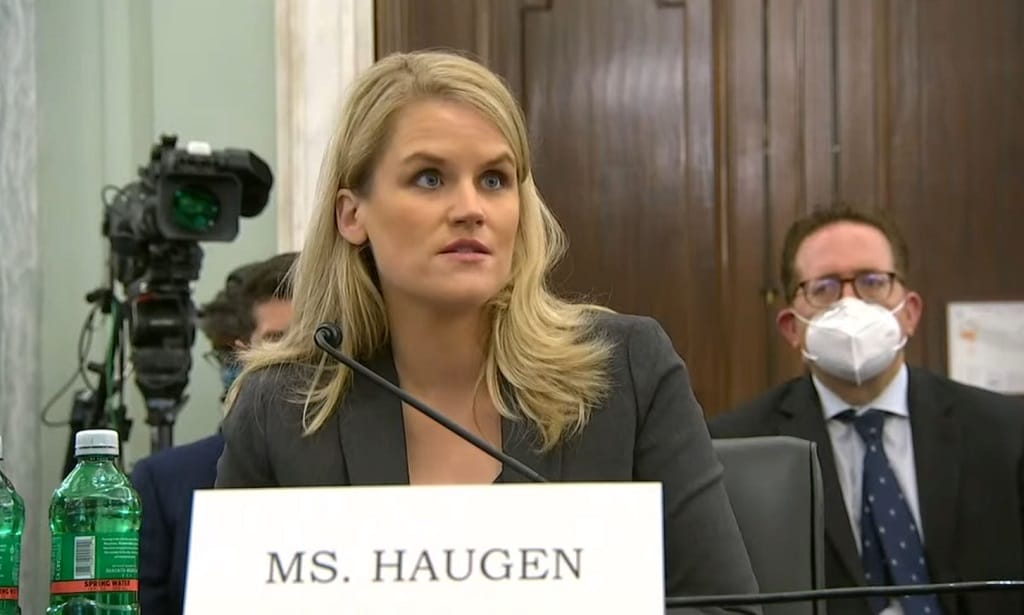Congress Must Force Facebook to Make Internal Research Public, Whistleblower Testifies
Frances Haugen testifies in front of the Senate studying protecting kids online after revealing herself as Facebook whistleblower.

WASHINGTON, October 5, 2021 – The former Facebook employee who outed herself as the whistleblower who leaked documents to the Wall Street Journal that showed Facebook knew its photo-sharing app Instagram contributed to harming the mental health of kids told a Senate committee that the company’s alleged profit-driven motives means the company’s internal research cannot be kept behind closed doors.
Frances Haugen testified Tuesday in front of the Senate Subcommittee on Consumer Protection, Product Safety and Data Security, which is looking into protecting kids online, after identifying herself Sunday on the television program 60 Minutes as the person who gave the Journal and the Securities and Exchange Commission documents showing the company going forward with development of a kids version of Instagram despite knowing the mental health impact its apps have on that demographic. (Facebook has since halted development of the kids app after the Journal story and lawmakers asking for it to be suspended.)
“We should not expect Facebook to change. We need action from Congress,” Haugen said Tuesday.
That action, she recommended, includes forcing Facebook to make all future internal research fully public because the company cannot be trusted to act on its own commissioned work.
Haugen noted that the reason the company did not — and does not — take such action, which could include preemptively shutting down development of its Instagram for kids product, is because the company is allegedly driven by a profit-first model.
“Facebook repeatedly encountered conflicts between its own profits and our safety. Facebook consistently resolved those conflicts in favor of its own profits,” alleged Haugen, who now considers herself an advocate for public oversight of social media.
“The result has been a system that amplifies division, extremism, and polarization — and undermining societies around the world. In some cases, this dangerous online talk has led to actual violence that harms and even kills people. In other cases, their profit optimizing machine is generating self-harm and self-hate — especially for vulnerable groups, like teenage girls. These problems have been confirmed repeatedly by Facebook’s own internal research.”
Despite calls to modify Section 230 of the Communications Decency Act, which shields large tech platforms from legal liability for what their users post, Haugen said that – and tweaks to its outdated privacy protections – won’t be enough.
Facebook has for months touted it removes millions of groups and accounts that violate its community guidelines on hate speech and inciting violence. But Haugen alleges that despite the claims that it actively makes its platforms safer, in actuality, it only takes down three to five percent of those threats.
Asked by Senator Ben Ray Lujan, D-New Mexico, if Facebook “ever found a feature on its platform harmed its users, but the feature moved forward because it would also grow users or increase revenue,” Frances said yes, alleging the company prioritized ease of resharing over the feature’s susceptibility to growing “hate speech, misinformation or violence incitement,” even though the feature would only “decrease growth a tiny, little amount.”
She also alleged that those directions came from the head of the company himself, Mark Zuckerberg, who allegedly chose arbitrary or vague “metrics defined by Facebook, like meaningful social interactions over changes that would have significantly decreased misinformation, hate speech and other inciting content.”
Facebook’s troubles, up to this point
Facebook has already been the target of Washington’s ire for months now. It has been cited as an alleged enabler of the January 6 Capitol Hill riot that sought to stop the transition to a Joe Biden presidency, despite the platform banning former president Donald Trump. Its platform had also been blamed for allowing the spread of information that has led to violence in parts of the world, including genocide in Myanmar.
The platform has already been accused of suppressing stories from progressive news outlets and censors information that conflicts with its own personal interest, and that its algorithms deliver the same kinds of information to people so they are not exposed to different viewpoints, as a number of public interest groups have claimed.
In 2018, Facebook made worldwide news after reports in the Guardian and the New York Times found nearly 100 million Facebook profiles were harvested by a company called Cambridge Analytica, which used the data to build profiles of people to provide them with material that made them sway in a political direction.
Federal regulators have already been looking to deal with Facebook and other Big Tech companies, as that has one clear agenda item of the Biden administration. The White House has already perched Amazon critic Lina Khan as the head of the Federal Trade Commission, which has recently filed a monopoly complaint against the company in court, and other figures, including Google critic Jonathan Kanter to the Department of Justice’s antitrust division.
Facebook’s week has gone from bad to worse. Haugen, a former Facebook product manager and Harvard MBA graduate, testified in a hearing titled “Protecting Kids Online” before the Subcommittee on Consumer Protection, Product Safety, and Data Security Hearing on Tuesday. Previous opposition to Facebook’s plans to expand its products to minors has come from external parties like public interest groups and Congress.








Member discussion